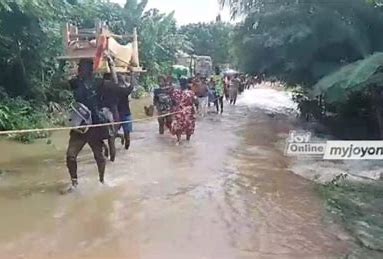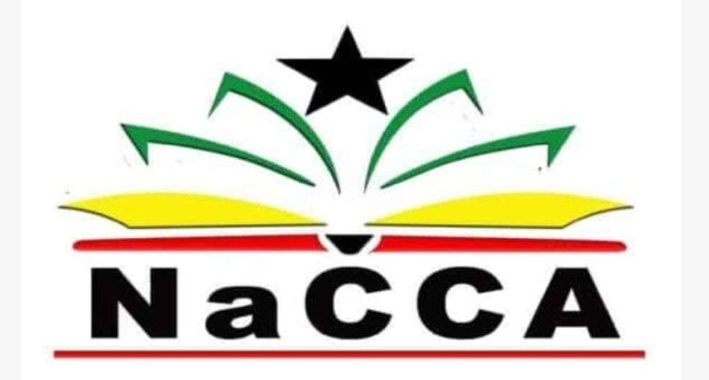NDC Expresses Concern Over Health Crisis Amid Dam-Induced Flood

In the wake of a devastating flood triggered by the controlled release of water from the Akosombo and Kpong Hydroelectricity installations, communities along the Lower Volta Basin are facing an impending health crisis, according to the National Democratic Congress (NDC), Ghana’s main opposition party.
The NDC has outlined the numerous challenges arising from this avoidable disaster, which encompass contaminated water sources and an increased risk of disease outbreaks. These concerns were raised in a statement signed by the NDC’s Volta Regional Communications Officer, Sorkpa Kafui Agbleze:
North Tongu
In the North Tongu Constituency, there has been a noticeable surge in reported cases of malaria and diarrhea. Additionally, the flooding has left seventeen health workers, including nurses, homeless due to the destruction of various health facilities.
South Tongu
The South Tongu District Hospital is grappling with an influx of patients due to the closure of the Comboni Polyclinic, which was submerged by floodwaters. The limited bed capacity has forced some patients to sleep on the floor.
South Dayi
The Kpongbonikope facility in South Dayi has been entirely cut off, depriving Adzibui residents of healthcare services. These communities are now forced to use contaminated floodwater for domestic and commercial purposes, exposing them to faecal-oral diseases and waterborne illnesses.
North Dayi
Communities like Awate, Tornu, Tsorxor, and Wusutakpebi rely on water from the Volta Lake, which is now polluted. With broken boreholes, residents have no option but to use contaminated water from the Volta Lake.
also read: EPA CEO Denies Pursuing Personal Gains with Bawumia (ghanaeducation.org)
Ketu South
Health facilities in Hatsukope and Blekusu have been compelled to close due to the floodwaters, leaving Klikor and Blekusu cut off from healthcare access.
Keta
People in Anyako, Seva, Borlorve, and Norlorpi are struggling to access healthcare, with some areas facing water supply shortages.
Anlo
Medical facilities in Kodzi, Galo-Sota, Trekume, and Tregui lack essential medical supplies.
In response to this critical situation, the NDC in the Volta Region has issued a call to action, urging several key measures:
– Increased piped water supply to affected areas, particularly in South Dayi and North Dayi Districts.
– Urgent repair of damaged boreholes and the construction of new mechanized boreholes in areas with pressing water needs.
– An intensive health campaign by the Ministry of Health in the affected regions and innovative solutions to alleviate the pressure on the Sogakope District Hospital.
– Enhanced deployment of mobile clinics in inaccessible areas.
– A boost in the supply of medical consumables to ensure proper healthcare delivery in affected areas.
In conclusion, the recent flood, resulting from the controlled release of water from the Kpong and Akosombo hydroelectric installations, presents a significant health crisis for communities along the Volta River. Immediate government support is required to address the health and environmental challenges these communities now face. Urgent relief efforts, long-term mitigation strategies, and robust healthcare support are essential to assist these communities in recovering and rebuilding their lives after this preventable catastrophe.
Please Share our post on ‘ NDC Expresses Concern Over Health Crisis Amid Dam-Induced Flood ‘.
BOOKMARK GHANAEDUCATION.ORG FOR MORE!
Send Stories | Social Media | Disclaimer
Send Stories and Articles for publication to [email protected]
We Are Active On Social Media
WhatsApp Channel: JOIN HERE
2024 BECE and WASSCE Channel - JOIN HERE
Facebook: JOIN HERE
Telegram: JOIN HERE
Twitter: FOLLOW US HERE
Instagram: FOLLOW US HERE
Disclaimer:
The information contained in this post on Ghana Education News is for general information purposes only. While we endeavour to keep the information up to date and correct, we make no representations or warranties of any kind, express or implied, about the completeness, accuracy, reliability, suitability or availability with respect to the website or the information, products, services, or related graphics contained on the post for any purpose.




 How to apply for 2024/2025 recruitment at GES recruitment portal
How to apply for 2024/2025 recruitment at GES recruitment portal  GPA raises concerns over NaCCA books assessment & approval role
GPA raises concerns over NaCCA books assessment & approval role  GES ranked 3rd in 2023/2024 Excellence Awards for MoE agencies
GES ranked 3rd in 2023/2024 Excellence Awards for MoE agencies